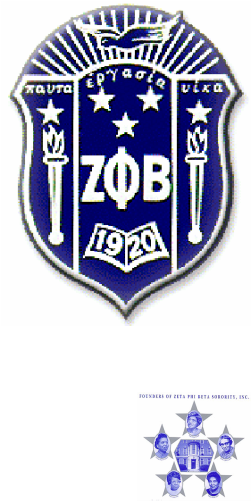
National History
Zeta Phi Beta Sorority, Incorporated was organized at Howard University on January 16, 1920, as the result of encouragement given to the five founders by Charles Taylor and Langston Taylor, members of Phi Beta Sigma Fraternity. These Sigma brothers felt the campus would benefit by the development of such an organization as sisters to the fraternity. Thus, Zetas and Sigmas became the first official Greek letter sister and brother organizations. We remain the only official and constitutionally-bound Greek-letter sister and brother organizations in the NPHC.
Our five founders chose not to embrace the tenets of established sororities and chartered Zeta Phi Beta Sorority to encourage the highest standards of scholarship through scientific, literary, cultural and education programs; promote service projects on college campuses and in the community; foster sisterhood; and exemplify the ideal of finer womanhood.
The five founders (called our "Five Pearls") of Zeta Phi Beta Sorority, Inc. are:
The introduction to greekdom and the Howard University community was at a formal reception at the Whitelaw Hotel in Washington, D.C. Brothers Langston and Charles Taylor served as hosts. The campus reception was held in the assembly room of Minor Hall at Howard University by Alpha Kappa Alpha and Delta Sigma Theta, the only other sororities. The first president of Zeta Phi Beta was Arizona Cleaver (Stemons).
Zeta Phi Beta Sorority was incorporated under the laws of the District of Columbia on March 30, 1923. The incorporators were: Myrtle Tyler, Gladys Warrington, Joanna Houston, Josephine Johnson, and Goldie Smith. The sorority is also incorporated in the states of Illinois and North Carolina.
Zeta Phi Beta Sorority's purpose is to foster the ideals of service, charity, scholarship, civil and cultural endeavors, sisterhood, and finer womanhood. These ideals are reflected in the sorority's national program for which its members and auxiliary provide voluntary service to staff community outreach programs, fund scholarships, support organized charities, and promote legislation for social and civic change.
Zeta Phi Beta Sorority, Incorporated was organized at Howard University on January 16, 1920, as the result of encouragement given to the five founders by Charles Taylor and Langston Taylor, members of Phi Beta Sigma Fraternity. These Sigma brothers felt the campus would benefit by the development of such an organization as sisters to the fraternity. Thus, Zetas and Sigmas became the first official Greek letter sister and brother organizations. We remain the only official and constitutionally-bound Greek-letter sister and brother organizations in the NPHC.
Our five founders chose not to embrace the tenets of established sororities and chartered Zeta Phi Beta Sorority to encourage the highest standards of scholarship through scientific, literary, cultural and education programs; promote service projects on college campuses and in the community; foster sisterhood; and exemplify the ideal of finer womanhood.
The five founders (called our "Five Pearls") of Zeta Phi Beta Sorority, Inc. are:
- Arizona (Cleaver) Stemons,
- Pearl A. Neal,
- Myrtle (Tyler) Faithful,
- Viola (Tyler) Goings, and
- Fannie (Pettie) Watts.
The introduction to greekdom and the Howard University community was at a formal reception at the Whitelaw Hotel in Washington, D.C. Brothers Langston and Charles Taylor served as hosts. The campus reception was held in the assembly room of Minor Hall at Howard University by Alpha Kappa Alpha and Delta Sigma Theta, the only other sororities. The first president of Zeta Phi Beta was Arizona Cleaver (Stemons).
Zeta Phi Beta Sorority was incorporated under the laws of the District of Columbia on March 30, 1923. The incorporators were: Myrtle Tyler, Gladys Warrington, Joanna Houston, Josephine Johnson, and Goldie Smith. The sorority is also incorporated in the states of Illinois and North Carolina.
Zeta Phi Beta Sorority's purpose is to foster the ideals of service, charity, scholarship, civil and cultural endeavors, sisterhood, and finer womanhood. These ideals are reflected in the sorority's national program for which its members and auxiliary provide voluntary service to staff community outreach programs, fund scholarships, support organized charities, and promote legislation for social and civic change.
